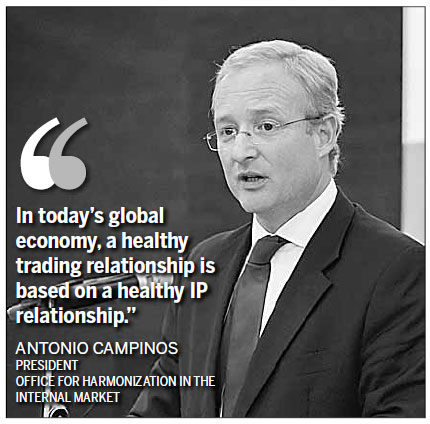A new round of cooperation on intellectual property between China and the European Union was launched on Jan 16.
The European side will provide a total investment of 7.5 million euros ($10.1 million) to fund a program called "IP: A Key to Sustainable Competitiveness", or IP Key for short. Around 1.5 million euros will be offered by the Office for Harmonization in the Internal Market, the largest IP agency in Europe.
On the Chinese side, the Department of Treaty and Law in the Ministry of Commerce will coordinate the Chinese contribution to the partnership, with the participation of some 15 IP authorities in the nation.
Zhang Xiangchen, assistant minister of the Ministry of Commerce, said at the launch ceremony that the partnership is a "model program" among those invested by the EU in China.
He said that IP protection is in the common interest of both China and the EU, and China has improved its IP competence through such cooperative programs.
He noted that one example is China' geographical indication system, which is "based on EU's expertise".
Keeping pace with rapid economic growth, the Chinese government and companies, as well as ordinary people are attaching increasing importance to IP, Zhang said.
"The situation is quite different from the early 1990s, when we were basically forced to protect IP because we were ignorant about what we could get from it."
"We have to recognize the discrepancy of knowledge and capability between developing countries and developed ones," he said. "So, technical assistance is critically important for the developing countries in enhancing the capability of IP protection."
The three-year new project is based on two prior EU-China IP cooperation projects - IPR1 from 1996 to 2004 and IPR2 from 2007 to 2011.
It is "yet another proof of the commitment by both parties to further strengthen our cooperation on IP issues with a clear objective", said Carmen Cano, deputy head of the EU delegation to China, in a keynote speech.
"This new phase will be defined not only by trade but more prominently by investment flows," she said, adding that the two sides have planned a negotiation this week on the high-quality and high-tech investment that "will increase innovation productivity and growth".
"China finds itself in a crucial moment in its history where it must redefine its model of growth in order to make a successful transition from a middle-income economy to a high-income economy. The key to unlocking innovation is the protection of IP.

"Innovation flourishes only in an environment where intellectual capital and other intangible assets are ideally protected, where trademarks, designs, patents, copyright and trade secrets receive full and fair protection to allow companies of both sides to safely engage in business development," she said.
While the previous IPR1 and IPR2 focused on legal framework and IP enforcement, the new project will "move from purely technical assistance to partnership and cooperation activities", said Antonio Campinos, president of OHIM.
"This is a new way of walking together that shows the maturity of the EU-China relations in the field of IP and the commitment of both parties to moving forward together," he said.
Some of the activities will be aimed at "spreading the message as widely as possible" about the value of protecting Chinese IP in the EU through roving seminars on Community trade marks and designs, which are registered in the EU as a whole rather than on a national level.
Other activities include peer-to-peer exchanges on best practices for examination, opposition, cancellation and quality assurance for trademarks, Campinos said.
"The aim is to create a better IP environment for the benefit of both EU and Chinese industries by further harmonizing the legal frameworks and practices, and providing open tools to increase the transparency and interoperability of systems."
According to the EU Directorate General for Trade, China is the EU's biggest source of imports and one of its fastest-growing export markets. China and Europe now trade more than 1 billion euros a day, which represents "a lot of intellectual property", Campinos said.
"In today's global economy, a healthy trading relationship is based on a healthy IP relationship - and that's where the new EU-China cooperation on intellectual property comes in," he said.
zhangzhao@chinadaily.com.cn
(China Daily 01/22/2014 page17)

